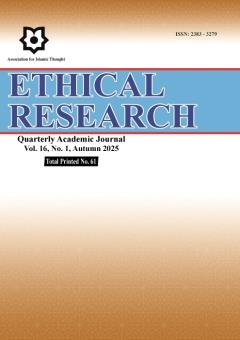Preventive and Ethical Obligations of Electronic Registration of Official Documents on the Prevention of Forgery of Official Documents
Subject Areas : اخلاق و تربیت اسلامیMohammad Khosravi 1 , Soudabeh Rezvani 2 , Sakineh Khan Alipour 3
1 -
2 - Department of Law, Khwarazmi University, Tehran, Iran.
3 - Department of Law, Imam Khomeini International University, Qazvin, Iran
Keywords: Ethical Requirements, Electronic Registration, State Prevention, Forgery, Official Documents.,
Abstract :
The use of preventive and ethical requirements in the electronic registration of official documents can significantly help in preventing the forgery of official documents. With the correct trust and confidence that people have in electronic official documents, these documents are considered as a source of validity and effectiveness, and the possibility of forgery or changing them is reduced. The system of instant registration of transactions, which is foreseen in the fifth development plan, by electronicizing all the stages of setting up and registering the transfer of official documents, provides the possibility for notary offices to register the transactions of individuals in the online process of the desired database about natural and legal entities. have access The basic question that is raised and investigated in this regard is, what is the effect of the preventive and ethical obligations of instant registration on the prevention of forgery of official documents? The current article is descriptive and analytical and has investigated the mentioned subject by using the library method. The results show that the elimination of handwritten books, including the notary's book and the signature certificate book, has had a significant effect in reducing crimes such as forgery and the use of fake documents. Preventive measures can include the use of fraud detection systems, strong encryption, two-step authentication, continuous monitoring of accesses and changes to documents, and the like. These measures effectively prevent any attempt to forge or alter official electronic documents. From an ethical point of view, emphasis on transparency, correctness, and trustworthiness in the registration and management of electronic official documents can help to promote the trust and credibility of documents. Compliance with ethical principles in relation to official documents has a significant effect in preventing their fraud and forgery. The implementation of instant registration in notary offices and equipping notary offices with electronic fingerprinting system will help the notary to a great extent in the matter of identity authentication and lay the foundation for the reduction of forgery crimes and the forgery of Article 100 of the registered law and to improve the speed and Accuracy in the preparation and registration of documents, authentication of persons, prevents the malicious intent of users, while informing about prohibited, barred and bankrupt persons prevents them from trading and the occurrence of subsequent problems, and the application of the electronic registration method in the country guarantees the security of official documents and Reducing the platform for committing crimes and common violations in the field of document and real estate registration, such as forgery.
